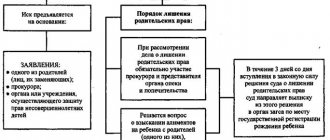If parents are unable to cope with their responsibilities, they are protected from raising children and living together with them. The Family Code of the Russian Federation (RF FC) provides for the restriction of a child from his mother (father) if they cruelly treat him or humiliate his human dignity. Unlike deprivation of parental rights, restriction is a preventive measure established for a strictly established period.
Restriction of parental rights can be initiated by any person interested in respecting the rights of a particular child: immediate relatives, guardianship authorities, government organizations. You can learn more about who has the right to bring a claim to court from specialists. They will tell you who exactly is considered the child’s closest relatives.
What is a restriction on parental rights?
Prohibiting one (or both) parents from participating in the upbringing of a minor child is called restriction of parental rights. It is awarded more often than deprivation of rights, and gives a chance to restore a normal family. The state protects the minor even if the parent has not yet done anything wrong, but may do so.
Close relatives, guardianship authorities, and grandparents can act as plaintiffs in court. They carry a package of documents indicating a violation of the child’s rights. Representatives of the guardianship authorities check living conditions in the family and interview neighbors. If it is confirmed that the child’s rights are being violated or he is in danger, the claim will be accepted.
A court hearing is held, the defendant is given a period of 6 months in which he must change his life. During the period of restriction, the parent's behavior towards the child is under strict control. At the same time, the father (mother) continues to support his son (daughter) and pays alimony. If during this time no positive changes occur, then the process of deprivation of parental rights is initiated.
By a court decision, T.’s claim against Principal K. for restriction of parental rights was DENIED
SOLUTION
IN THE NAME OF THE RUSSIAN FEDERATION
08/07/2015 Oktyabrsky District Court of Samara, consisting of:
presiding Rodivilova E.O. with the participation of the assistant prosecutor of the Oktyabrsky district of Samara Naumova KV., with secretary Ivanov A.A., having considered in open court civil case No. 2-3474/15 on the claim of T. to K., a third party to the Department of Guardianship and Trusteeship of Oktyabrsky and Zheleznodorozhny districts Samara on restriction of parental rights,
INSTALLED:
T. filed the above statement of claim, citing the fact that the defendant is the father of her granddaughter, A., born ***, his wife, K., who is her daughter, died on November 17, 2005 in connection with with illness. After the death of her mother, A. lived with her for about a year and a half; during this period of time, she, her grandparents, as well as the defendant’s parents, were involved in her upbringing, development and support. K. visited her about 2 times a month, stopping by for 1.5-2 hours. When A. turned 3 years 2 months old, he decided to raise the child on his own, despite the plaintiff’s arguments that a small child cannot be alone in the apartment while the father is busy at work. As a result, they had to hire nannies at their own expense, but due to the defendant’s regular scandals with them and the father’s cruel treatment of the child that took place in their presence, they quit after 2-3 months of work. The girl's cohabitants were actually raising the girl, but the defendant reduced his role in raising her to punishment for any offense, screaming, humiliation, mental violence, and methods of cruel physical treatment were also often used. Until now, the defendant has in every possible way prevented and limited the girl’s communication with her grandparents, and has not allowed A. to engage in activities or take part in her life. Only after lengthy persuasion did the defendant sometimes let the child go with them on vacation or for the weekend. Because of this treatment, A. experiences anxiety, fear and enormous stress when communicating with his father. After the latest bullying, A. categorically refused to live with her father; no persuasion has any effect on her. She does not want to return home, and therefore currently lives with them. The defendant also evades fulfilling his obligations to support the child: they pay the basic fees for school and A. for additional classes. They also organize and pay for their granddaughter’s vacation. On the father's part, there is no interest in developing his daughter's personal qualities.
Requests, taking into account clarifications, to limit K.’s parental rights in relation to a minor child, A., *** year of birth; appoint guardian A., born ***, grandmother, T.; determine the place of residence of a minor child, A., born ***, the place of residence of the guardian Samara, st. ***; recover from K. in favor of T. alimony for the maintenance of granddaughter A., born ***, in the amount of 1/4 of all types of earnings monthly, starting from the date of filing the application until the child reaches adulthood.
The representative of the plaintiff, P.L. Koldov, acting on the basis of a power of attorney, supported the claims at the court hearing, taking into account the clarification, asked them to be satisfied on the grounds set out in the claim, indicating that during her stay with her grandparents the girl became calmer, her her performance at school has improved, she goes to fitness classes, communicates with her peers, her grandparents do not interfere with communication with her father, with A.’s father they live with them twice, and more often she herself does not want to communicate with him, because she is afraid that her father will return will begin to put physical and moral pressure on her.
At the court hearing, plaintiff T. supported the stated claims, taking into account the clarification, in full, asked to satisfy them, pointing out that she saw the only possible way to resolve the situation that had arisen as restricting K.. in parental rights, since otherwise could lead to irreversible changes in the girl’s psyche. The girl grows up without a mother, and therefore she sees her mission as helping the child grow into a physically and aesthetically developed personality.
Defendant K. at the court hearing objected to the satisfaction of the claims, explaining that the circumstances set out in the claim were untrue, like all the arguments that he had no desire to raise a child. He met his father halfway, and when A. was little, they hired nannies, but this did not produce results, and therefore he sent the child to kindergarten, the daughter went to kindergarten with pleasure. He lived with the child, studied fully, enrolled him in the “Baby Club” and other child development institutions, spent a sufficient amount of time, did not limit the plaintiff’s opportunity to be with the child, at their suggestion the child spent the summer outside the city, he was not against it. There were no financial claims regarding child support. In the first grade, the child went to after school, but this was soon stopped. All this time he was teaching the child and attending parent-teacher meetings. The plaintiffs voluntarily offered to help him. He saw no damage from this. Subsequently, he was repeatedly asked, when his wife died, to give the child to the plaintiff. The daughter never expressed that she did not like living with him. One girl lived with him for 7 years and currently continues to communicate with his daughter; he has been living with another girl for about two years. They spent this New Year with A. together, in February 2015. he was granted leave and wanted to go to Sochi with A., but the plaintiff was against it. As a result, they went together with the girl. Upon returning, the plaintiff told him that the child was in an extremely neglected state and invited him to get closely involved in her education. As a result, after the child lived with the plaintiff for a month, did not attend school for a month, and he began to tell her that it was necessary to catch up in class, all this caused a protest in the child, and the plaintiffs played on this. On March 19, 2015, A. left home to live with her grandparents. There were no attempts on their part to resolve the conflict. All recommendations of the guardianship authority were not implemented by the plaintiff. They kept the child away from him while he took steps to mend his relationship with his daughter. Only in the last two weeks the situation has changed, A. stayed at his house last weekend, is currently at his house until Sunday evening.
At the court hearing, the representative of the defendant, Antonov A.P., acting on the basis of a power of attorney, objected to the satisfaction of the claims on the grounds set out in written objections, indicating that no facts indicating dangerous actions for the child on the part of the father were presented to the court , all statements are unfounded and not supported by testimony. Today, the child has been living with her grandmother for about six months, so the defendant cannot pose any danger to the child, especially since the girl’s relationship with her father has begun to improve. The child’s place of residence is the place of residence of his legal representative. The requirements for the appointment of a guardian are stated in contradiction with the current legislation, since he is appointed by the guardianship and trusteeship authorities, the court does not have such a right.
Representative of the department of guardianship and trusteeship of the Zheleznodorozhny and Oktyabrsky districts of the Administration of the city. Samara - Maikubaeva Zh.Zh., acting on the basis of a power of attorney, at the court hearing objected to the satisfaction of the claims, pointing out that the case materials do not contain evidence that in the K. family there was a real threat to the life and health of minor A., facts of cruelty treatment of minor A. was not established. There is an intra-family conflict between the plaintiff and the defendant regarding the issue of raising a girl.
At the court hearing, A. was interviewed, who showed the court that her relationship with her dad is not very good, he comes home from work late, she sits at home or alone, and in this case she does her homework on her own, and when dad returns from work, it’s late, he scolds her for every mistake; if she is at home with Dasha, then during the day they do homework with her. She is currently staying with her grandmother for about the last 6 months. The reason for moving to my grandmother was that dad slapped her on the head for every misdemeanor, swore at her, sometimes the scolding was for her studies, sometimes for her misdemeanor, and when he screams, she starts to shake. The slaps on the head happened once a month, once a week, in different ways. Once my dad hit me in the legs with a belt, this was at the beginning of this year. While living with my grandparents, I communicated with my father on the phone, went with him to the movies and cafes. She loves her father, communicates with him with pleasure, but does not want to live with him.
At the court hearing, A.S. Pugacheva was interrogated as a witness, who testified to the court that she works at school No. 6, in the said school A. studies in the 5th grade, she teaches English in the said school from grades 1-11. A. has known since September last year, since she began teaching English in their class. The situation in K.’s family is familiar to her, since it was discussed at the teachers’ council; within the framework of this process, she represents the school as a whole. A. is a depressed girl, sad, inactive, although she has potential. A. told her that she doesn’t have a very good relationship with her dad, he scolds her. There was a case when a dad lashed out at a child at school, and the administration made comments to the dad. Teachers are interested in the child’s progress, and due to the fact that A. was absent-minded, A.’s progress throughout the year was not very good. Recently, the girl has changed, she began to smile, the child began to study better, and in the fourth quarter she began to study better. She believes that it is much better for the child to live with her grandparents, she is more comfortable there, also because dad works and they don’t. She couldn’t say anything about physical violence from her father, since these facts were unknown to her, but when a child is severely scolded, there is moral pressure. She did not personally witness physical or mental violence. In her opinion, the girl’s academic performance has improved since they began to study with her. The school did not contact the guardianship and trusteeship authorities, since there were no facts of beating by the father.
Questioned at the court hearing as a witness, S. testified to the court that she had known the whole family for more than 10 years and was the wife of the defendant’s father. A. grew up before her eyes, she loves her. She pays close attention to A.'s life, since she does not have her own children. After Olga’s death, when the child was 1 year and 4 months old, A. lived with T. At 3 years and 2 months old. K. took her to his place. K. has no goodwill towards A. When A. went to first grade, they offered to pick her up from school and prepare her homework, but K. refused and said that let the child learn to be independent. In the third grade, she often spent the night with them, and once she saw A.’s bruise. The girl said that her dad hit her, then threw her into the bathroom, and she hit herself. She told T. about this, after which A. was examined, but nothing terrible was found, everything was normal. After some time, A. stopped going to the pool, to her question: “What is the reason?”, A. explained that everyone there was laughing at her, due to the fact that she had bruises on her legs, and the bruises formed because that her father hit her on the legs with a belt. She knows that K. often slaps girls on the back of the head, she knows about this from A.’s words, and it also happened in her presence at the girl’s birthday this year. When A. was little, all material expenses were on them. On March 19, 2015, A. called with tears and said: “Dad is going to kill me now, I didn’t answer his SMS,” A. asked to be taken away from home. They and T. arrived at K.’s house, there was a huge scandal, T. took the girl away and from that time on she has been living with them. For a long time, A. did not want to communicate with her father; she did not answer the phone. Now they are communicating. A. said that she would communicate with him, but not live. Before the trial, she invited K. to meet and conclude a settlement agreement. The meeting took place, there were T., K.T. told him that he should apologize to A.. He was offered to pick her up on weekends, or when he was in a good mood. He was offered to agree to custody, but K. said that he was not selling the child. He believes that it is better for the child to temporarily live with T., since the father is not raising the girl properly enough.
G., interrogated as a witness at the trial, showed the court that he is K.’s father and A.’s grandfather. In his presence, there was no physical violence against A. on K.’s part. There was a moral impact. K. had one policy: you couldn’t leave the house. K. reacted to all the little things, punished A. for them, and this is child abuse. Believes that you cannot punish a child all the time. He knows that on March 19, 2015, A. called T. and asked to pick her up, there was a scandal, she did not want to go home. Now she and her granddaughter see each other often. During the time she lived with her grandmother, she began to smile and changed. He knows that T. went to court to restrict parental rights, so as not to ask K. about whether it is possible to take A. on vacation so that they have the necessary medical documents for A. He believes that his son is not a bad father, but the authorities are exceeding over the mind.
S., who was questioned as a witness at the trial, testified to the court that when A. was born, her mother was sitting with A. alone, she and her wife came to help, and her father went to play billiards. After the death of their daughter, they decided that A. should live with them, for which the wife reduced her working hours, the father came 1-2 times a week, had dinner and left. When A. turned 3.5 years old, they began to decide the question of where the child should live. K. said that the child should live with him, they found a nanny who looked after the child. She told them how K. came and how he behaved there. They often came to their houses and helped A. In the 4th-5th grade, A. got stuck in basic subjects and had unsatisfactory grades at school. Their father told them that they were raising them wrong, and they had to cancel all tutors. On March 19, 2015, A. called them and told them to pick her up because... K. yells. They arrived and there was a scandal near the entrance. They approached him with an offer to give A. to them for 1-2 days so that she would calm down, but he refused. Then they called the Guardianship authority and asked that someone be sent, and the police would come. He also explained that he witnessed with his own eyes how K. suddenly hit the child on the head with all his might, and they constantly observed these outbursts of rage and rage. When they came to A.’s birthday, congratulated her, gave her gifts, the father sat irritated, A. dropped something and immediately received a slap on the head. A. is not an ideal child, but she needs to be dealt with. When she came to live with them, they told her that they would do their homework together. Now there are positive changes in my studies. They do everything in the interests of A., they begged K., they advised him not to send him to after-school care, but he answered, the child is his, he himself knows. When the granddaughter lived with her father, she did not communicate with her peers, now her friends do not leave them, they go to the dacha together. Restrictions on K.'s parental rights are necessary due to his attitude towards the child. Their goal is not to take the child away, but for the father to find contact with his daughter. They need a restriction so that the child wants to live with his father. They have neither a medical insurance policy nor the opportunity to travel abroad so that the child can rest without his consent. Since March 2015, their father has not helped them financially.
Ryzhova S.I., questioned at the court hearing as a witness. showed the court that K. is her own nephew, the son of her sister Galina Ivanovna, T. are the parents of Olga, his wife. The situation in their family is normal, their relationship is good. A. was born in ... year, and 1.5 years later Olga died, K. raised A. on his own. The child is now 11 years old, she has not complained about her dad, she has a grandson who communicates with A., and she has never spoken badly about her father in front of them. She did not see violence or abuse on the part of K. towards A.. On March 18, 2015, K. had a birthday, and a month later, the plaintiff and defendant began to fight for the child, after March 18, 2015, she did not see A., she knows about the situation only from K.’s words.
Lykova D.S., interrogated at the court hearing as a witness. showed the court that she had been living with the defendant for 2 years, met him in 2013, met A. in May 2013, and in the summer of 2013 they went to Bulgaria. T. knows that they are grandparents on A.’s mother’s side. During her stay with K., she often communicated with A. The relationship between A. and K. can be characterized on the good side, she immediately liked them, she saw a caring person in K. father, A. never complained about a bad relationship with her father, did not start conversations to leave home. A. lived with them, she or Slava picked her up from school, there was control over her studies. During classes and communication, K. did not use swearing or obscenities; no one allowed himself to scream. A. had to ask her to do her homework, but no one was rude, no violent actions were committed against her by K.. Since March 19, 2015, A. has been living with T.. For her and K. it was a surprise, that A. decided to leave home, perhaps this is due to the fact that they could not take her to the sea last summer or go skiing this winter. Last summer, T. went to Bulgaria for the whole summer, they wanted to take A., the question was raised about this, but difficulties arose regarding the documents, so they came to the conclusion that it was better for A. to stay at home, T. were in the know. After the summer, A. fell behind in her studies, studying was not easy for her. In February 2015, they decided to go on vacation to Krasnaya Polyana, but T. persuaded A. to stay here, and as a result, A. remained in the city. The decision was made by everyone, not only K., but the child harbored a grudge against it. Over the past six months, she and A. continue to communicate, she came to school, corresponds with the girl on the Internet, in Contacts. A. stayed overnight with them last weekend, now she is at their house with her friend, she and she went to the cinema and to a cafe. All meetings with my father were by mutual desire. A. was glad to see these meetings, there were hugs, joy, there were no protests. K. pays for school and bears other expenses for the maintenance of A., regarding clothes, they were in the store and bought her what she needed.
Having heard the persons involved in the case, the testimony of witnesses, the conclusion of the assistant prosecutor of the Oktyabrsky district of Samara, who believed that the claims cannot be satisfied, and having examined the case materials, the court considers it necessary to refuse to satisfy the claims on the following grounds.
According to Art. 63 of the RF IC, parents have a priority right to raise their children over all other persons.
By virtue of Art. 73 of the RF IC, the court may, taking into account the interests of the child, decide to take the child away from the parents (one of them) without depriving them of parental rights (limiting parental rights). Restriction of parental rights is permitted if leaving a child with his parents (one of them) is dangerous for the child due to circumstances beyond the control of the parents (one of them) (mental disorder or other chronic illness, a combination of difficult circumstances, etc.).
Restriction of parental rights is also allowed in cases where leaving a child with the parents (one of them) due to their behavior is dangerous for the child, but sufficient grounds for depriving the parents (one of them) of parental rights have not been established. If the parents (one of them) do not change their behavior, the guardianship and trusteeship authority, six months after the court makes a decision to limit parental rights, is obliged to file a claim for deprivation of parental rights. In the interests of the child, the guardianship and trusteeship authority has the right to file a claim to deprive the parents (one of them) of parental rights before the expiration of this period.
Clause 3 Art. 73 of the RF IC establishes that a claim for restriction of parental rights can be brought by close relatives of the child, bodies and organizations charged by law with the responsibility for protecting the rights of minor children (clause 1 of Article 70 of this Code), preschool educational organizations, general educational organizations and other organizations , as well as a prosecutor.
In accordance with Part 1 of Art. 55 of the RF IC, a child has the right to communicate with both parents, grandparents, brothers, sisters and other relatives.
The court established that A. was born ... in the city, her parents are K. and K., which is confirmed by the birth certificate of the series .....
Mother A. - K., who is the daughter of T., died ... according to the death certificate of the series ...
Plaintiff T. is the grandmother of minor A. As follows from the inspection report of the living conditions of K., living at the address: ..., K., to whom this apartment belongs by right of ownership, and his daughter, A. are registered in the specified residential premises. is a three-room privatized apartment. The premises have all amenities. The apartment is warm, bright, clean, cosmetic repairs have been made. The floors in the rooms are covered with linoleum, the walls are covered with wallpaper. Common areas are in satisfactory condition. Plumbing and electrical equipment is in working order. The apartment has no damage or destruction. There is the necessary modern furniture and household appliances. The sanitary and hygienic condition of the rooms is good, the living space is kept in order. The apartment has everything necessary for the full development of minor A. She occupies a separate room, which has a place for sleeping, studying and relaxing. There is a sufficient supply of seasonal clothing and shoes. The Department of Guardianship and Trusteeship believes that in the residential premises at the specified address there are satisfactory conditions for living, harmonious upbringing and development of A.
According to the characteristics issued by the Department of Anti-Corruption Law of the Samara Region dated June 30, 2015, K. works in ... in the position ... He has proven himself exclusively on the positive side, as a responsible, executive employee. Works well not only in normal situations, but also in stressful situations, always maintaining optimism, self-control and a positive attitude towards work and colleagues. No one has ever seen him “lose his temper.” No violations of labor discipline were noted. In the team he proved himself to be a reliable comrade, ready to help the organization’s employees and support them in any situation. He is a person of high moral character. Does not smoke or drink alcohol, carries a useful social responsibility, and avoids conflict situations. When communicating, he is friendly and open, has high personal goals and ambitions, and is capable of making thoughtful independent decisions. Responsible for decisions made and actions taken.
From the characteristics of student A., it follows that A. entered ... school class ... in 2010 at the age of 6 years 7 months. Early entry to school and lack of parental assistance in preparing homework led to learning difficulties. The school psychologist diagnosed pedagogical neglect. On the recommendation of doctors, in the third grade the girl was transferred to home schooling. During the year, V.’s grandmother took A. to individual lessons with teacher Galina Vladimirovna Mzhelskaya. There have been educational successes in mathematics and the Russian language. In the fourth grade, A. returned to school. However, the omissions of the first years of education and the lack of help from his father in doing homework affected his academic performance. In the leading academic subjects (Russian language, mathematics, English), A. has annual grades of “C”. In the fifth grade, the girl often came to school without prepared and checked homework. A. has not developed an interest in educational activities. Only in the last quarter of the 5th grade, when A. came to live with T.’s grandmother, did she begin to complete her homework in full and show interest in class activities. In the Russian language for the quarter I received a grade of “four”. During June, on the initiative of grandmother A., she came to her school teachers for additional individual lessons in mathematics and English. A. has good relationships with her peers, she actively takes part in class activities, in preparing concerts, school holidays, she is friendly and proactive. During the academic year, there were conflict situations with teachers in Russian and English. At the request of her grandmother, the girl was transferred to another group. At the end of the school year, relationships with teachers improved.
MKU g.o. Samara, on the basis of a court request, on July 10, 2015, a psychodiagnostic examination of T., K. and minor A. was carried out, based on the results of which the Center’s specialists came to the conclusion that K. had violations in educational methods, parental attitudes, and parental attitudes not found. No violations were identified in T.'s parental attitudes. K. has ambivalent feelings towards his daughter. For T.A. he is a close person. T. strives for a symbiotic relationship with A. K. has no desire for symbiotic relationships with A. The absence of symbiotic relationships is a necessary condition for the separation process in adolescence. A close and significant person for A. is grandfather K. According to the results of observation: T.’s dominant behavior during joint activities causes protest reactions in A., at the same time, in the interaction between K. and A. there is a willingness to compromise and cooperate. It was recommended that K. undergo parental effectiveness training; in order to restore the emotional relationship between A. and K.’s father, psychocorrectional work is necessary.
From the conclusion based on the results of a psychodiagnostic examination of A., carried out by Candidate of Psychological Sciences Dobrovidova N.A., it follows that A. (11 years old) had an average level of self-esteem, slightly increased anxiety, a neutral attitude towards his father with a desire to distance himself, a positive attitude towards grandparents; perception of the father's attitude as predominantly directive, hostile and inconsistent; perception of the grandmother's attitude as predominantly positive and adequately demanding. Since the emotional well-being of a teenage child is characterized by positive relationships with others, adequate and high self-esteem, and a stable emotional state, it can be assumed that relationships with grandparents are more favorable for the emotional well-being of a girl than relationships with her father. The recommendations indicate that it is necessary to create emotionally positive conditions in the family for the development of the child, and to establish a unified system of educational requirements by the father, grandparents.
As stated by the court above and follows from the provisions of Art. 73 of the RF IC, restrictions on parental rights are allowed if leaving a child with a parent is dangerous for the child due to the behavior of the parents when there are insufficient grounds for depriving the parent of parental rights. The result of satisfying a claim for restriction of parental rights is the taking of a child from the parents, and their loss of the right to raise their child personally.
In this case, the court found that from March 19, 2015 to the present, the child has been living with his grandparents, so the defendant cannot pose any danger to the child.
The court also found that the reason for the girl’s leaving home was the axis of the existing conflictual relationship between the father and the child. It was also established that between the girl’s father, on the one hand, and her grandparents, on the other, there are disagreements on the issue of raising the child, which follows from the conclusions of a psychodiagnostic examination, the conclusion of a specialist from the guardianship and trusteeship authority in a court hearing. According to the recommendations contained in these psychodiagnostic reports, in order to normalize relations in the family, it is necessary to establish a unified system of educational requirements by the father, grandparents, as well as psychocorrectional work to restore the emotional relationship between A. and father K. According to the explanations of the representative of the guardianship and trusteeship authority, father A - K. expresses readiness for psychocorrectional work, but there are obstacles to this from T.’s grandparents. The court also found that the relationship between father and daughter has now improved, the girl stayed overnight at her father’s house on weekends, and at the time the court made the decision she was also at her father’s house and was going to stay the whole weekend.
From K.’s explanations it can be seen that he loves his daughter, is involved in her upbringing and development, takes care of her health, and provides financially. Spends all his free time with the child.
It follows from the case materials and no evidence to the contrary has been presented to the court that the defendant was not punished for improper performance of parental responsibilities in relation to the child, preventive work was not carried out with him, he was not warned that his parental rights could be limited, criminal and (or ) K. was not held administratively liable and is not registered with drug treatment or psychoneurological dispensaries.
The court found that the defendant works, does not abuse alcohol, has a desire to raise a child, is ready for psychocorrectional work to normalize relations with his daughter, therefore the court comes to the conclusion that the plaintiff’s statement that the child’s presence with the defendant could be dangerous for her life and health, is premature, and considers it necessary to refuse to satisfy the claims.
Since the court rejects the claim for restriction of parental rights, the plaintiff’s demand for alimony also cannot be satisfied, since it is derivative from the main one.
The plaintiff’s demand to establish guardianship and determine the place of residence of the child at the place of residence of the guardian cannot be satisfied, since, firstly, the court refused to limit K.’s parental rights, and secondly, according to paragraph 4 of article 74 of the RF IC, art. . 11 Federal Law No. 48-FZ of April 24, 2008 “On guardianship and trusteeship”, a guardian is appointed by the guardianship and trusteeship body, in cases provided for by law, but not by the court.
Based on the above, guided by Articles 194-198 of the Code of Civil Procedure of the Russian Federation, the court
DECIDED:
In satisfying T.’s claims against K., a third party, the Department of Guardianship and Trusteeship of the Oktyabrsky and Zheleznodorozhny districts of the city. Samara about restricting parental rights - refuse.
The decision can be appealed to the Samara Regional Court through the Oktyabrsky District Court of Samara within a month from the date of issuance of the reasoned decision. The final solution was made on August 12, 2015.
Judge Rodivilova E.O.
Differences between restriction and deprivation of parental rights
Both measures are established by the court, in which the prosecutor and representatives of the guardianship and guardianship authority must participate. The differences lie in the legal consequences of application. Deprivation of parental rights is a more severe measure than restriction; it is awarded in extreme cases.
| Application factors | Restriction of parental rights | Deprivation of parental rights |
| Reasons for award | Possible danger to the child | Committing illegal actions |
| Term | Set for a specific period (usually 6 months) and lasts until its end | Forever or until the parents restore their rights |
| Communication with children | Allowed if there is no negative impact | Forbidden |
| Child's location | With a second parent, guardian or caregiver | Stays with the second parent, guardian, enters a special government institution |
| Benefits for children, alimony, state benefits, inheritance | May receive | They have no right to |
| Adoption of a child by another person | Impossible | Maybe |
| Legal relationship | Saved | Lost |
| Initiators (plaintiffs) | Close relatives, guardianship authorities, medical workers, teachers | Second parent, guardian, trustee, prosecutor |
Both deprivation and restriction of rights give parents the opportunity to change their views on family values and attitudes towards their children. This is both a punishment and a tool for preventing unfaithful behavior of one or both spouses. However, returning deprived rights is much more difficult than canceling the restriction of parental rights.
Example of a statement of claim
In the Kytmanovsky District Court of the Altai Territory
Plaintiff: Veronika Igorevna Lebedeva, address: 659240, p. Kytmanovo, st. Kurganova, 22,
tel. 6874613684631
Defendant: Lebedeva Alena Pavlovna,
05/12/1991 year of birth, place of birth: s. Kytmanovo, address: 659240, village. Kytmanovo, st. Kurganova, 2,
passport 5495 No. 634321321
Interested person: guardianship and trusteeship body of the Administration of the village. Kytmanovo, address: 659240, village. Kytmanovo, st. Krasnoarmeyskaya, 19
Statement of claim for restriction of parental rights
I am the grandmother of Svetlana Petrovna Lebedeva, born in 2006, who currently lives with her mother, Alena Pavlovna Lebedeva (defendant). My son, Petr Nikolaevich Lebedev, who is Veronica’s father, died in 2011. After his death, the defendant began to periodically drink alcohol and lead an antisocial lifestyle.
As a result of her behavior, she contracted tuberculosis. The disease was diagnosed on January 12, 2020 in the Kytmanovsky district hospital, about which there is a corresponding conclusion. She did not complete the course of treatment and is not completing it, despite repeated visits by Rospotrebnadzor. Due to the above circumstances, I am afraid of the development of her illness and the danger to others, including my granddaughter Svetlana.
The mother of the child, in violation of Art. 65 of the Family Code does not fulfill his parental responsibilities to ensure physical, moral, and spiritual development.
In addition, the mother's antisocial behavior negatively affects the development of the child's personality. And I am not able to resist him. In March 2021, the granddaughter (child) was registered with the commission on juvenile affairs. At the same time, it was I, not my mother, who came to talk with the police officer. Over the past year, my granddaughter’s academic performance has decreased significantly.
In accordance with Part 5 of Art. 73, paragraph 2 of Art. 74 of the Family Code of the Russian Federation, restriction of parental rights also implies the collection of alimony for the maintenance of a child and does not relieve one from such an obligation.
To confirm the stated circumstances, I ask you to call witnesses to the court - neighbors of A.P. Lebedeva: Viktor Ignatievich Krotov (Kytmanovo village, Kurganova St., 4), Inna Vasilievna Petrenko (Kytmanovo village, Kurganova St., 3) , school director Lidiya Ivanovna Petrenko (Kytmanovo village, Lenina St., 12), interview Rospotrebnadzor employees in the district.
In connection with the above, guided by Art. 73 RF IC, art. 131-132 Code of Civil Procedure of the Russian Federation,
Ask:
- Restrict Alena Pavlovna Lebedeva, born on May 12, 1991, place of birth: s. Kytmanovo, in parental rights in relation to Svetlana Petrovna Lebedeva, born May 12, 2006.
- To recover from Alena Pavlovna Lebedeva, born on May 12, 1991, a native of the village. Kytmanovo, alimony for the maintenance of Svetlana Petrovna Lebedeva in the amount of 1/4 of earnings from all monthly income.
Application:
- Birth certificate of Lebedeva S.P. (copy);
- A copy of the birth certificate of the father, Lebedev P.G.;
- Certificate from the Committee on Juvenile Affairs;
- Request for evidence
- Notification of sending the claim and documents to the defendant.
Lebedeva V.I. November 16, 2021
Both parents can have their rights limited
Both the father and the mother may have their rights limited, and the reasons for the award are somewhat different. The Family Code of the Russian Federation (FC RF) contains clear provisions regarding restrictions on the rights of parents (one of them) (Article 73). The main reason: the behavior of the spouses, which can negatively affect the psyche or harm the physical health of children.
A father falls under this article if he treats a child rudely and cruelly, humiliates his human dignity, drinks, or uses drugs. In relation to the mother, unsatisfactory physical or psychological health is added to the reasons for restricting parental rights.
Reasons for applying the measure
The legal basis for limiting parental rights is clearly provided in the legislation, namely in paragraph 2 of Art. 73 IC RF. It states that the reason for this is the creation of a dangerous environment for a minor in which he is located. As such, danger to a child can arise for various reasons, which can be divided into two groups:
No parental guilt
In this case, there is a danger to the child, but it is caused by factors that do not depend on the will of the parties. For example it could be:
- serious illness of the father or mother;
- various mental disorders;
- presence of severe conflict in the family;
- other situations.
The presence of guilt of the parents (both or one of them)
In this case, unlawful behavior of the father or mother may be observed, for example:
- systematically leaving a child unattended by one of them;
- alcohol abuse (including when it causes family quarrels and scandals);
- drug use and brothel maintenance, etc.
As such, the presence or absence of guilt in the situation that has arisen does not affect the decision to limit parental rights.
If it is determined that as a result of the actions or inaction of the father or mother, a real threat to the health or life of the child is created, then this measure will be applied.
It is worth considering that the determination of the presence or absence of this threat occurs only in court, after consideration of all the circumstances of the case. If the court comes to the conclusion that a threat exists, but there are still no sufficient reasons for complete deprivation of rights, then it may decide to limit them.
How long can restriction of parental rights last?
The law defines the validity period of the restriction as 6 months. When they pass, the measure is either removed or changed to a more stringent one - deprivation of parental rights. The first occurs if the defendant has reformed, restored the relationship with the child, and does not refuse to raise and support him. Only a judge can terminate the restriction early.
However, Russian legislation does not prohibit extending restrictions. The period can be extended or assigned indefinitely, for example, in the case of mental illness of the father (mother). In this case, documents and testimony must be provided proving the fact of mental impairment.
The second outcome of the case: preventive measures did not bring results, and the father (mother) continues to behave in an “obscene” manner. A court hearing is scheduled to terminate parental rights. This is a more severe punishment, promising parents harsh consequences.
Grounds for restriction of parental rights
The grounds for applying this measure to parents (or one of them) are specified in Article 73 of the Family Code of the Russian Federation. Note that some reasons may exist, or they may only threaten the child. For example, there is no physical violence, but it is obvious that it can happen.
List of possible reasons:
- the father (mother) does not have the opportunity to be with the children for reasons beyond their control that pose a danger;
- communication and living with the father (mother) threatens the life of the child;
- lack of proper care and supervision;
- there is an unhealthy family situation (alcoholism, fights);
- physical or mental violence is applied to a minor;
- parents are involved in criminal activities;
- one of the spouses does not pay alimony.
Legislation
Relations between parents and children belong to the family category, therefore they are regulated, first of all, by the Family Code of the Russian Federation.
In particular, Article 73 of the RF IC is devoted to the limitation of parental rights, and Art. 74 of the RF IC, and issues of its abolition - Art. 76 RF IC.
First of all, it’s worth deciding what a limitation is.
parental rights is the taking of a child from his parents (one of them or both) without deprivation of rights. This measure is aimed primarily at protecting children from danger or harmful influences that occur to them when living with their father or mother.
However, it can only be applied to the mother or father. As for other categories of persons caring for a minor (for example, guardians, trustees, adoptive parents, adoptive parents), other ways are provided for them in which children can be protected from possible danger.
Restriction of rights can be either an independent measure applied to parents or a temporary method of influence that precedes the complete deprivation of rights.
It is worth considering that only a court can decide on its application.
Moreover, if the parents’ behavior does not change within six months, a procedure may be initiated to deprive them of their rights.
Cancellation of restrictions on parental rights
To cancel the restriction of parental rights, judges and plaintiffs need evidence that the parent overcame a difficult situation and resolved problems in relations with children. If this happens, a new trial is held, which will result in the restrictions being lifted.
Stakeholders: relatives, guardians, trustees - must make sure that the parent’s lifestyle has changed. The abolition of restrictions on parental rights will be completely fair if the child himself confirms that he is comfortable in the family. The court considers, first and foremost, the interests of the children.
Sources:
“Family Code of the Russian Federation” dated December 29, 1995 N 223-FZ (as amended on March 18, 2019). Articles 73–76, 69–71
Procedure for restricting rights
The initiators of the legal process may be the guardianship authorities or a close relative of the child. Most often, fathers of young children are defendants in court, and less often - mothers. The procedure for reducing paternal and maternal rights has some differences.
Fathers are temporarily removed from raising children for the following reasons:
- Causing physical and mental harm to the health of a minor;
- Cruel methods of education;
- Use of illegal substances, alcoholism.
The mother may have limited rights due to:
- Mental illness;
- Drunkenness, drug addiction;
- Beating a child;
- Evasion of alimony payments.
Expert commentary
Kolesnikova Anna
Lawyer
The ban on living with a child is lifted or confirmed 6 months after the court made a decision to limit parental rights. In addition, during the consideration of the case, the issue of assigning alimony payments for the maintenance of children is decided.
Required documents
In order to file a lawsuit against unscrupulous parents, you will need to collect a package of documents. It includes:
- Document on the birth of the baby;
- Certificate of marriage or divorce;
- Characteristics of parents and child;
- Certificate of health of the minor;
- Conclusion of the guardianship authorities;
- A copy of the defendant's passport.
The application must be drawn up correctly, otherwise the claim will not be accepted in the court office. A sample of filling out the document can be downloaded or found at the information stand in the courthouse.
The form indicates:
- Name of the territorial branch of the court;
- Personal information about the defendant and applicant;
- List of grounds for restricting the defendant’s rights to the child;
- Claim;
- Links to legal acts regulating the relationship between a child and his parents;
- List of attached documents and evidence;
- Signature of the person applying.
The main part of the application must indicate the position of the plaintiff, his opinion about the living conditions of the child. Cases on restriction of parental rights are heard by district judges. The package of documents with the claim is submitted to the court at the place of residence of the defendant.








